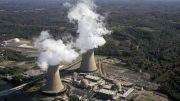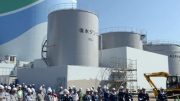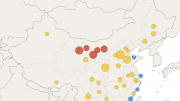Five years after the world’s second-worst nuclear disaster in Japan, the nuclear power industry is far from dead.
A 9.0-magnitude earthquake shook northeastern Japan on March 11, 2011, triggering a tsunami that destroyed four nuclear reactors at the Fukushima Daiichi nuclear power plant. The meltdown released radioactive waves into the air, leading to a mass evacuation order, billions of dollars in cleanup and total shutdown of Japan’s nuclear program.
But it also brought into question the safety of nuclear reactors all around the world. Nearly every country using nuclear power undertook comprehensive safety checks.
[…]
Although the world’s trust in nuclear power may have skipped a beat, the industry seems to have shaken it off. About 11 per cent of the world is powered by nuclear energy, roughly the same as in 2011, according to the World Nuclear Association (WNA).
[…]
While some countries went the phase-out route, many more opted to continue with their nuclear programs. There are currently 65 reactors under construction around the world, with a further 150 in planning. And some countries are going nuclear for the first time, including Bangladesh, Indonesia and Thailand.
“Globally, the state of the nuclear power industry is probably more positive now than it was immediately prior to 2010,” said World Nuclear Association spokesperson Jonathan Cobb.
The industry has hit a new high in terms of the number of reactors under construction at any one time, according to Cobb, who suggested the boom is in response to “concerns over greenhouse gas emissions, air pollution and reliability.”
Cobb also cited the reviews and safety checks done in the wake of Fukushima as key to renewed global confidence in nuclear.
Uranium stock prices haven’t fared well in the aftermath of Fukushima. Prices immediately dropped by 8.9 per cent after the 2011 disaster and continued to fall. They currently sit at $34.62 per pound — a 45-per-cent drop over 2011.
Fears that demand might decrease is mostly to blame, explained David Sadowski, a mining analyst for Raymond James. “As Germany, Japan and others made nuclear-negative announcements, expectations for future uranium demand decreased and prices dropped,” he said.
But Sadowski expects to see a rebound in the uranium market, thanks to the restart of the Japanese nuclear fleet as well as investment in new reactors, primarily in Asia.
Bevan Hamilton
The full version of the original article
available at CBCnews.ca






Be the first to comment on "5 years after Fukushima, nuclear industry alive and well"